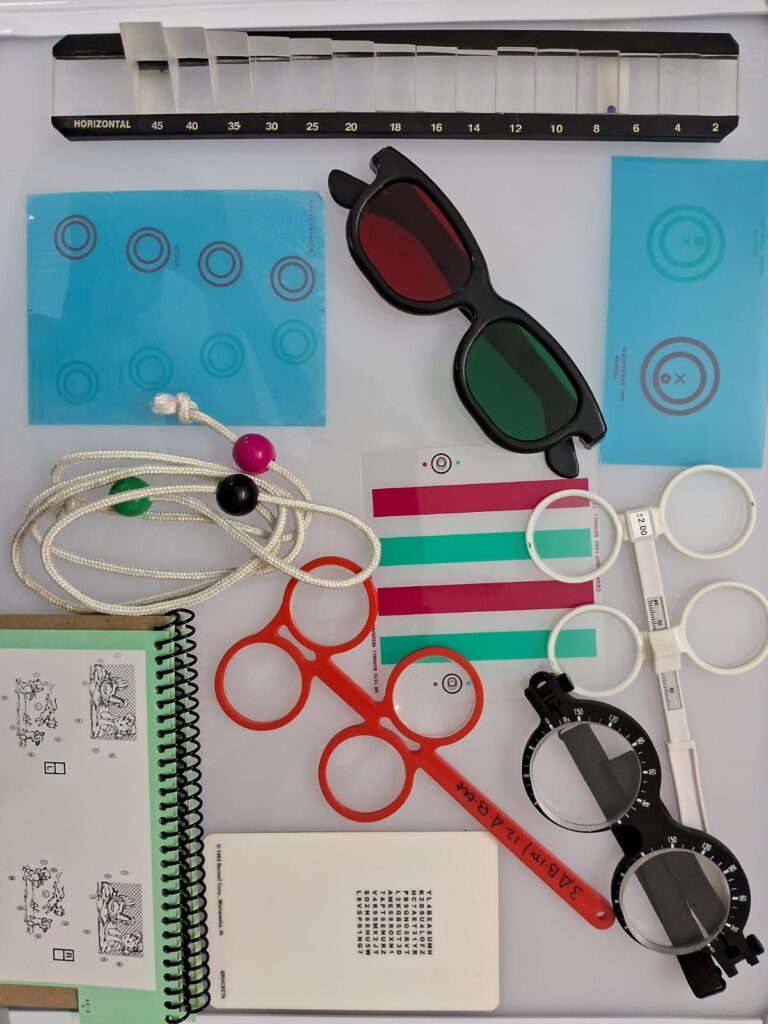Vision is one of our most important senses allowing us to navigate the world and take in visual information. But for many people, vision issues can create significant challenges in daily life. This is where vision therapy comes in- a specialized field that helps patients improve their visual skills and overcome vision-related problems.

What is Vision Therapy?
Vision therapy is a customized program of visual activities and exercises designed to train the eyes and brain to work together more effectively. It’s often used to address conditions like lazy eye (amblyopia), crossed eyes ( strabismus), focusing problems, and visual-motor integration difficulties.
Unlike simple prescribing glasses or contacts, vision therapy targets the underlying neurological causes of vision issues. Through a series of in-office and at-home exercises, patients work to develop better eye teaming, tracking, focusing and visual processing abilities.
Who needs Vision Therapy?
Everybody! While vision therapy can be beneficial for everyone, certain individuals stand to gain the most from this specialized form of care.
Here are some key groups that can see significant improvements through vision therapy:
- Computer related Vision problems– The prevalence of digital screens in our daily lives has led to a rise in “Computer-vision syndrome” – a group of vision related issues like blurred vision, dry-eyes, and headaches. Vision therapy can help patients develop better visual habits for extended screen time.
- Poor eye coordination/teaming– Patients struggling with conditions like fusional vergence dysfunction, where the eyes have difficulty working together, often experience symptoms like eye strain, headaches and double vision. Vision therapy can train the eyes to coordinate more effectively.
- Focusing problems– Accommodation dysfunction or difficulty focusing the eyes, can make everyday tasks like reading a challenge. Vision therapy exercises strengthen the eye’s focusing abilities.
- Poor eyesight– For individuals with lazy eye ( amblyopia) or other binocular vision issues, vision therapy can be transformative. It helps train the brain to use both eyes together, improving depth perception and visual processing.
The Benefits of Vision Therapy
The impact of vision therapy can be truly like-changing for patients. Here are some key benefits:
Improved Academic and Work Performance: Many learning and reading difficulties are rooted in underlying vision problems. Vision therapy helps patients develop the visual skills needed for smooth, efficient reading and information processing. This can lead to major improvements in academic or work performance.
Enhanced Sports and Activity Participation: Proper visual-motor coordination is crucial for success in sports, hobbies, and other physical activities. Vision therapy hones hand-eye coordination, visual reaction time, and peripheral awareness- giving patients a competitive edge.
Reduced Eye strain and headaches: Conditions like convergence insufficiency, where the eye have trouble working together, can cause eye strain, headache, and fatigue. Vision therapy trains the eyes to work in harmony, alleviating these troublesome symptoms.
If you or a loved one are struggling with vision-related problems, I encourage you to explore the transformative potential of vision therapy.
With the guidance of qualified vision therapist at Finevision Clinic, you can develop the visual skills to unlock new opportunities and live life to the fullest.
Contact us today to learn more and get started on your journey to clearer, sharper vision.
#vision #computervisionsyndrome #convergenceinsufficiency #eyestrain #eyefatigue #finevision